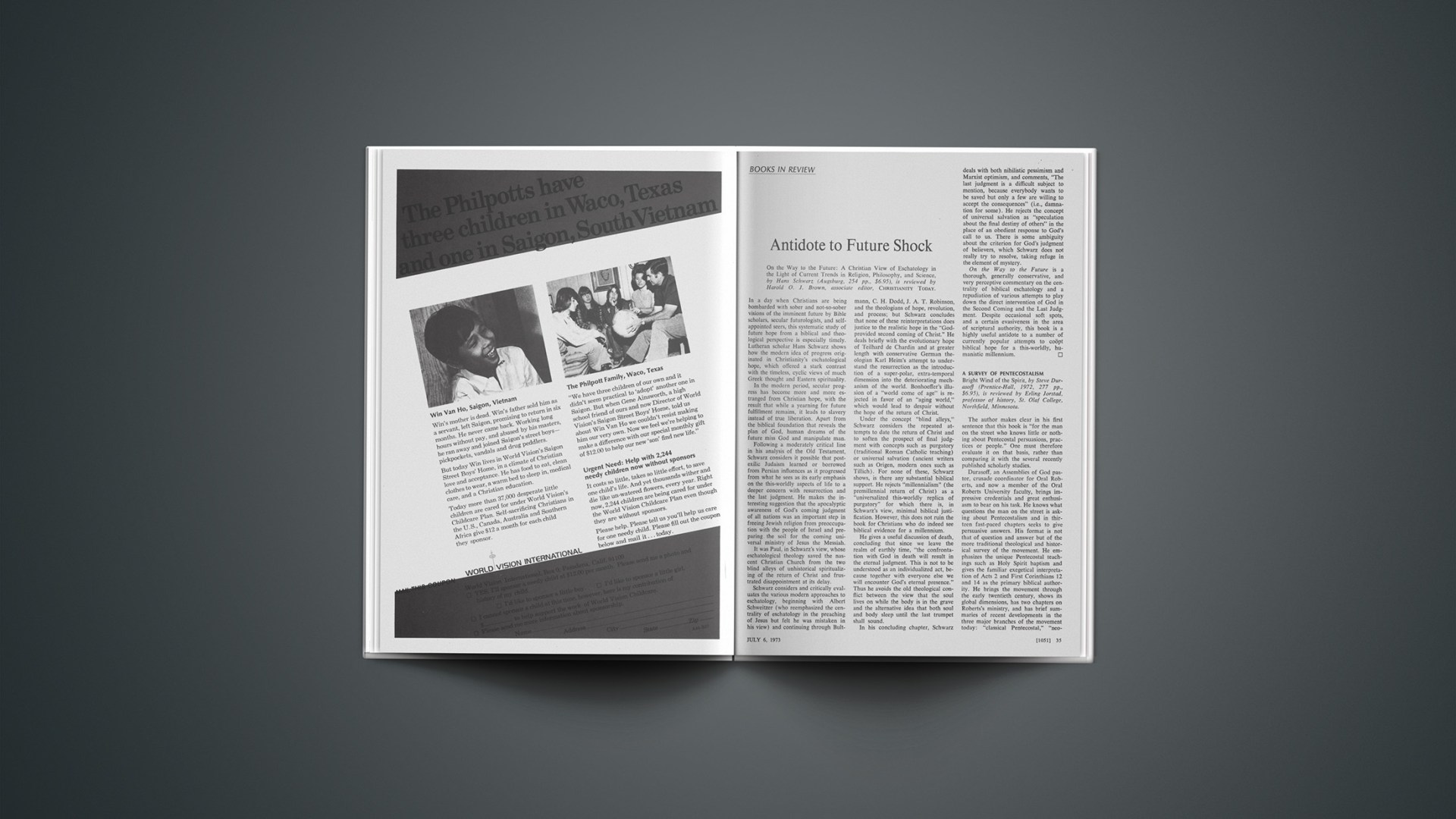On the Way to the Future: A Christian View of Eschatology in the Light of Current Trends in Religion, Philosophy, and Science, by Hans Schwarz (Augsburg, 254 pp., $6.95), is reviewed by Harold O. J. Brown, associate editor, CHRISTIANITY TODAY.
In a day when Christians are being bombarded with sober and not-so-sober visions of the imminent future by Bible scholars, secular futurologists, and self-appointed seers, this systematic study of future hope from a biblical and theological perspective is especially timely. Lutheran scholar Hans Schwarz shows how the modern idea of progress originated in Christianity’s eschatological hope, which offered a stark contrast with the timeless, cyclic views of much Greek thought and Eastern spirituality.
In the modern period, secular progress has become more and more estranged from Christian hope, with the result that while a yearning for future fulfillment remains, it leads to slavery instead of true liberation. Apart from the biblical foundation that reveals the plan of God, human dreams of the future miss God and manipulate man.
Following a moderately critical line in his analysis of the Old Testament, Schwarz considers it possible that post-exilic Judaism learned or borrowed from Persian influences as it progressed from what he sees as its early emphasis on the this-worldly aspects of life to a deeper concern with resurrection and the last judgment. He makes the interesting suggestion that the apocalyptic awareness of God’s coming judgment of all nations was an important step in freeing Jewish religion from preoccupation with the people of Israel and preparing the soil for the coming universal ministry of Jesus the Messiah.
It was Paul, in Schwarz’s view, whose eschatological theology saved the nascent Christian Church from the two blind alleys of unhistorical spiritualizing of the return of Christ and frustrated disappointment at its delay.
Schwarz considers and critically evaluates the various modern approaches to eschatology, beginning with Albert Schweitzer (who reemphasized the centrality of eschatology in the preaching of Jesus but felt he was mistaken in his view) and continuing through Bultmann, C. H. Dodd, J. A. T. Robinson, and the theologians of hope, revolution, and process; but Schwarz concludes that none of these reinterpretations does justice to the realistic hope in the “God-provided second coming of Christ.” He deals briefly with the evolutionary hope of Teilhard de Chardin and at greater length with conservative German theologian Karl Heim’s attempt to understand the resurrection as the introduction of a super-polar, extra-temporal dimension into the deteriorating mechanism of the world. Bonhoeffer’s illusion of a “world come of age” is rejected in favor of an “aging world,” which would lead to despair without the hope of the return of Christ.
Under the concept “blind alleys,” Schwarz considers the repeated attempts to date the return of Christ and to soften the prospect of final judgment with concepts such as purgatory (traditional Roman Catholic teaching) or universal salvation (ancient writers such as Origen, modern ones such as Tillich). For none of these, Schwarz shows, is there any substantial biblical support. He rejects “millennialism” (the premillennial return of Christ) as a “universalized this-worldly replica of purgatory” for which there is, in Schwarz’s view, minimal biblical justification. However, this does not ruin the book for Christians who do indeed see biblical evidence for a millennium.
He gives a useful discussion of death, concluding that since we leave the realm of earthly time, “the confrontation with God in death will result in the eternal judgment. This is not to be understood as an individualized act, because together with everyone else we will encounter God’s eternal presence.” Thus he avoids the old theological conflict between the view that the soul lives on while the body is in the grave and the alternative idea that both soul and body sleep until the last trumpet shall sound.
In his concluding chapter, Schwarz deals with both nihilistic pessimism and Marxist optimism, and comments, “The last judgment is a difficult subject to mention, because everybody wants to be saved but only a few are willing to accept the consequences” (i.e., damnation for some). He rejects the concept of universal salvation as “speculation about the final destiny of others” in the place of an obedient response to God’s call to us. There is some ambiguity about the criterion for God’s judgment of believers, which Schwarz does not really try to resolve, taking refuge in the element of mystery.
On the Way to the Future is a thorough, generally conservative, and very perceptive commentary on the centrality of biblical eschatology and a repudiation of various attempts to play down the direct intervention of God in the Second Coming and the Last Judgment. Despite occasional soft spots, and a certain evasiveness in the area of scriptural authority, this book is a highly useful antidote to a number of currently popular attempts to coopt biblical hope for a this-worldly, humanistic millennium.










